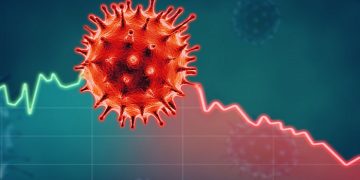THE NETHERLANDS – The number of people who have tested positive in the Netherlands for coronavirus rose by 1,019 to 7,431 in the past 24 hours. Of that total, 434 patients have died, an increase of 78 from statistics release on Wednesday, public health agency RIVM said.
The increase in total patients is below 16 percent, similar to figures from the past three days and a reduction in infection rate from the prior week. “The number of patients admitted to hospital and the number of deaths are increasing less rapidly than you would expect without [intervention] measures. This could potentially be an indication that the measures are effecting the rate the virus is spreading,” the RIVM said in a statement.
There was also a 17 percent increase in the number of hospitalizations, the agency stated. Since the virus responsible for the Covid-19 illness was first discovered in the Netherlands at the end of February, 2,151 people have required hospitalization. That increase of 315 patients included registrations added to the daily statistics from Monday through Thursday, including over 150 on Wednesday alone. As of Wednesday evening at least 644 people were being treated in intensive care, according to the association of ICU professionals.
Of those hospitalized, 1,774 also had an additional health condition. Thirty percent of those had cardiovascular disease or were hypertensive, 16.5 percent had a chronic lung affliction, and 14.5 percent required treatment for diabetes. Those three categories were also the most common conditions affecting 388 patients who had a prior health condition before passing away.
There are now 2,161 patients who reside in Noord-Brabant, an increase of 246. The province is responsible for about 29 percent of all patients in the country, continuing a downward trend seen for two weeks as the infection rate increases in other provinces. While Noord-Brabant showed an increase below 13 percent, Zuid-Holland (1,042) and Noord-Holland (1,029) had an increase in infected residents of over 17 percent compared to Wednesday.
“In the provinces of Friesland and Drenthe are home to the fewest infections with 71 and 72 people tested positive respectively.”
The RIVM continues to test on a more limited scale compared to other countries, with the RIVM saying it tests about a thousand people per day, and Health Minister Hugo de Jonge putting that maximum capacity at two thousand tests daily. A key limiting factor is the scarcity of supplies, including a proprietary buffer solution made by pharmaceutical giant Roche. The Roche-branded equipment used to test those samples requires the solution based on the terms of the sale, but De Jonge said the Netherlands has the capacity to make it domestically.
Members of Parliament were pushing De Jonge on Thursday to force Roche to release their formula so more tests may be conducted in 35 labs around the country. The Netherlands is also looking at sourcing diagnostic equipment from another firm to resolve the problem.
The RIVM also relaunched its infection tracker, with which it wants to more accurately track the spread of the coronavirus. As many people who contract the virus only have mild symptoms, many are never officially tested and therefore don’t form part of the figures. The health service wants Netherlands residents to sign up and track what symptoms they have. When this tracker first launched, the RIVM had problems with its site settings and no one could access it. It is now up and running and interested parties can register here.
Longfonds, the foundation for patients with lung diseases in the Netherlands, is worried that the coronavirus may be causing permanent lung damage to people infected with it, NU.nl reports. Because Covid-19 is a new virus, there is still much uncertainty regarding future complaints from patients who recovered from it. Longfonds is particularly worried about patients in ICU with Covid-19 who need to be ventilated – they seem to be at greatest risk of permanent damage.
“There may be inflammation that causes scar tissue on the lungs,” pulmonologist Leon van der Toorn said to the newspaper. This could mean that we will soon have many more people with lung problems. A new lung disease is developing.”
On Thursday, King Willem-Alexander visited the Ministry of Foreign Affairs’ contact center, where employees are working 24/7 to bring Dutch stuck abroad home. He spoke to employees about their experiences, and spoke to other Foreign Affairs officials about the coronavirus outbreak.
Budget institute Nibud launched a ‘money newspaper’ to help people who suddenly have less to spend due to the coronavirus. “Because a grip on money gives peace in these troubled time,” the institute said. The newspaper contains ideas on where to save, such as critically examining your subscriptions, and tips on how to keep a cool head and resist tempting offers.
Amsterdam UMC teamed up with sports organizations NOC*NSF and KNVB to create advice on how to stay fit while stuck at home during the coronavirus crisis. This stipulates, among other things, that adults and older people should exercise moderately to intensively for 2.5 hours a week, including two sessions of muscle and bone strengthening exercises. Kids between 4 and 18 should exercise an hour a day, and do three muscle and bone strengthening activities per week. If you have a fever, exercising is not recommended.


















